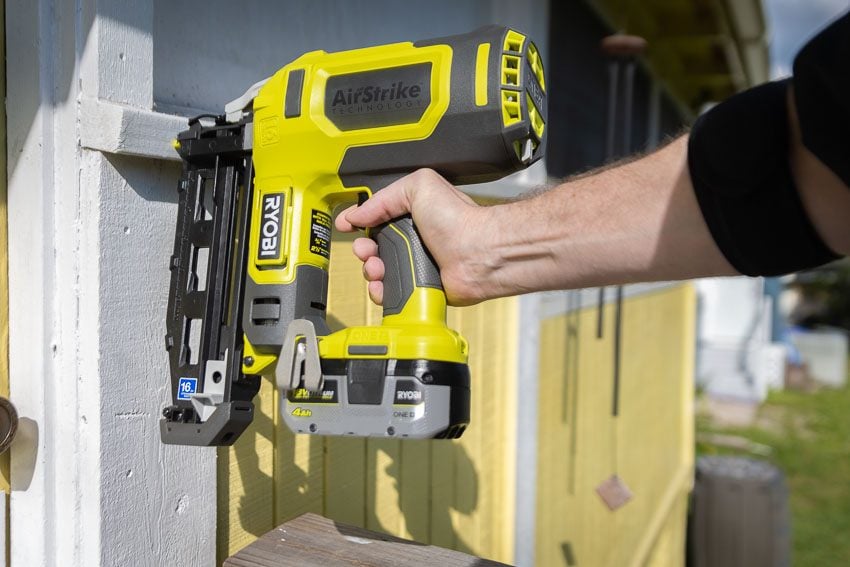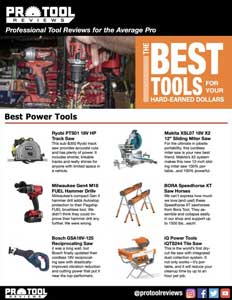Ryobi updates their 18V Cordless Finish Nailer
Driving 16 to 15 gauge nails between 0.75-inch to 2.5-inch, finish nailers are extremely useful on the jobsite or around the house. They are great at installing door casings, crown molding, window sills, and other carpentry jobs where strength is important. We use brad nailers for trim that is more delicate and likely to split with a thicker nail. The outgoing cordless Ryobi P325 cordless 16-gauge finish nailer performed exceptionally well—even earning a Pro Tool Innovation Award. The updated Ryobi P326 cordless finish nailer has improved features such as a slimmer tip for more precision nailing.
Pros
- 0.75-inch to 2.5-inch 16 Gauge nails
- Stops firing when the magazine is almost empty
- Tooless jam clearing
- Work light that activates without firing the tool
- Easy to use controls
- Easy to reload nails
Cons
- Will not sink 2″ or longer nails into hardwoods like oak
Ryobi P326 Finish Nailer Performance
If you have never used a nail gun before, you will be impressed at how fast the Ryobi 16 Gauge Finish Nailer can drive 2.5-inch nails. If you have used other cordless nail guns, you will know what to expect. This is a little faster than my old one. It is not as fast as the premium models but it does not come with the sticker shock of those models either. It may not be quite as fast as the fastest performers but it is no slouch either. The Ryobi Finish Nailer will drive 2.5-inch nails below the surface of most woods all day long.
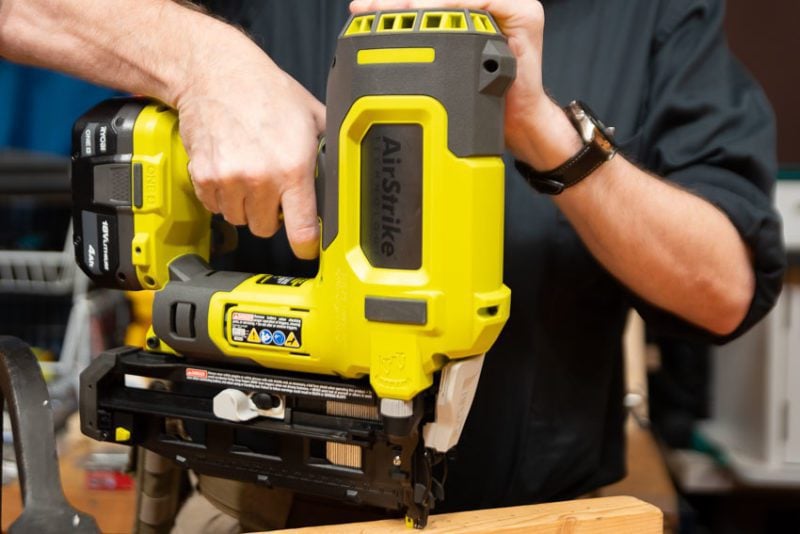
I have to give it the caveat “most woods.” It will still drive nails into hardwoods such as red oak and maple, but not 2-inches and over. Only some of the premium nail guns will. Some furniture makers may want to pass because of this but everyone else should ask themselves if they would ever be driving fasters that deep into hardwoods. I don’t think I ever will, and I’m a woodworker who uses exclusively hardwoods. I still chose to buy the previous Ryobi model for my own tool collection as I thought it was a great value and a great performer.
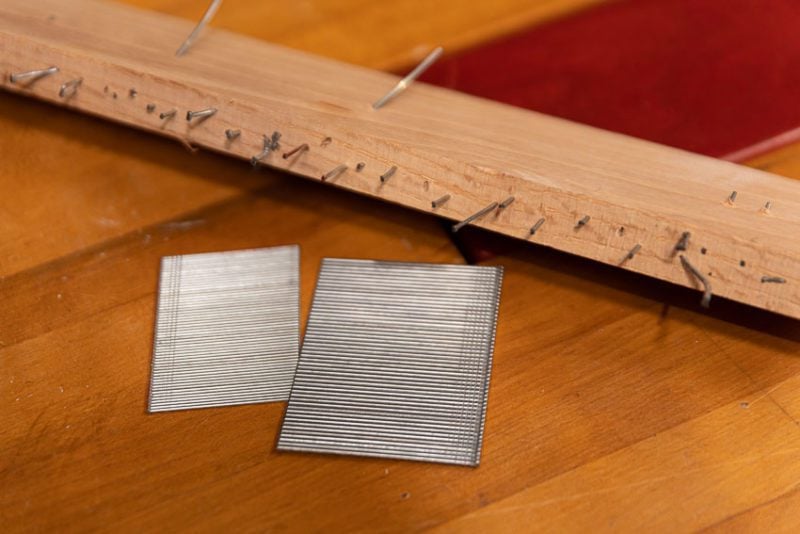
Some people may wonder why this tool doesn’t include a bump fire mode. This is not a framing nailer. It is a finish nailer. Finish nailers are for neat, controlled precise work, not sloppy “get it done as fast as possible” work.
Ryobi Finish Nailer Design Notes
Controls
The Ryobi Finish Nailer places a lever on the top of the tool to control power. Move it one way to increase it; move it the other way to decrease it. I found that you get the most power not when the lever is pointing at full power but when it is one stop short of full power. I found the same thing to be true of the Ridgid 18-gauge brad nailer.
Moving on down the tool is the depth gauge which is very easy and straightforward to use. The depth gauge sets a mechanical distance on the head that modifies how deep the nail goes into the wood. You use the power control dial like the psi setting on a compressor. Ensure you have enough power to drive the nail into the material. Then, set the depth gauge depending upon whether you want your nails flush or recessed into the material. The two controls work very well together.
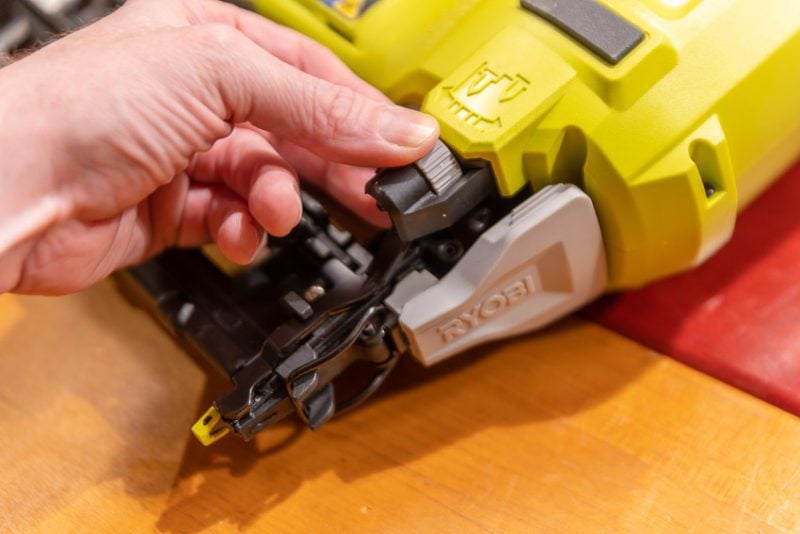
To load nails in the tool, simply pull back on the side handle until it locks into place. Next, slip a clip or section of 16 gauge nails into the end. Up to 105 nails fit into the magazine at a time. Push the release button to slide the side hangle forward again which feeds the nails into the firing mechanism. If you ever encounter a jam (I did not) Ryobi provides a toolless release mechanism to clear the jam from the firing mechanism.
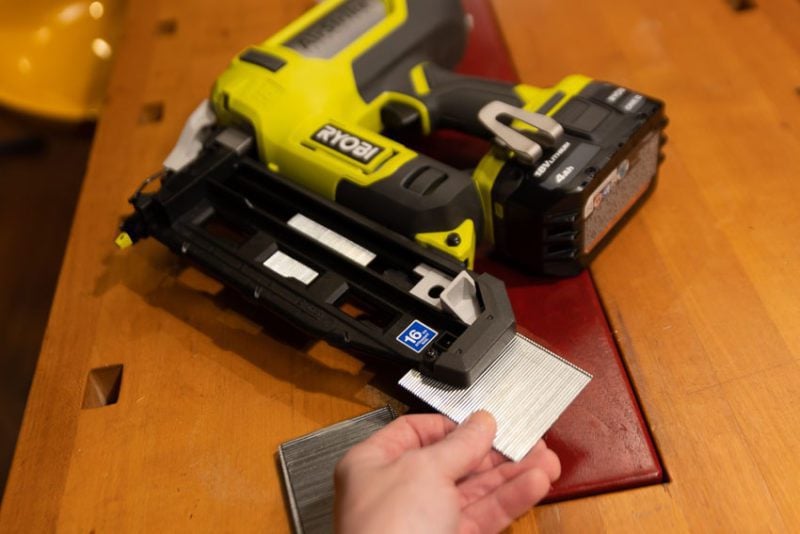
Other nice details of the Ryobi Finish Nailer include an LED light that is triggered by a secondary switch on the handle. There is also an additional non-marring rubber nose cone stored on the tool itself should you lose the one on the firing mechanism.
Ergonomics
As usual for a battery-powered nailer, the Ryobi P326 cordless finish nailer weighs more than a comparable air nailer. On the plus side, you don’t need to deal with a compressor or air hose, so pick your poison. Best of all, you don’t have the noise of the compressor running which I hate with a passion.
The nailer itself is very comfortable to use. I like having the included belt clip if for no other reason than for going up and down ladders the OSHA-approved way (hands-free).
It may be a small detail, but one of my favorite changes from the old model is the inclusion of a “16 Gauge” logo on the side of the nailer. Some of Ryobi’s nailers are very difficult to tell apart, especially their 18 gauge brad nailer and their 18 gauge narrow crown stapler. I wish their entire lineup had logos, or at the very least stickers on the side to distinguish them when shoved in a toolbox.
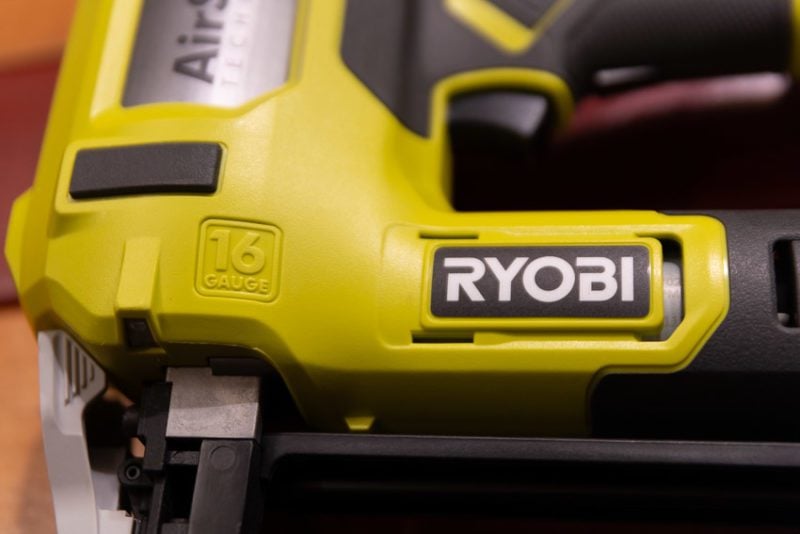
Ryobi Finish Nailer Price
The Ryobi 16 Gauge Finish Nailer retails for $228 as a kit including a 2.0 Ah 18V battery and charger. It also comes with some sample nails and a belt clip. We’re fairly certain Home Depot will have a tool-only version available as well.
The Bottom Line
The Ryobi 16 Gauge Finish Nailer is a great tool for DIYers, anyone with a big project, or perhaps even Pros who occasionally need a finish nailer (like paint crews). The Ryobi can get the job done and fits the sweet spot between the premium tools with their premium price tags and less capable tools. In my opinion, they offer the most bang for the buck. That is why I bought almost the entire line of Ryobi cordless nail guns for myself.
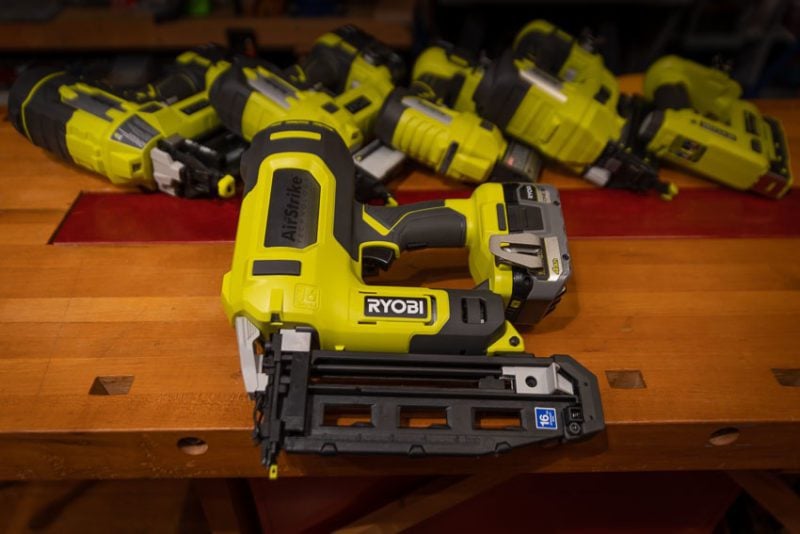
Ryobi Finish Nailer Specifications
- Weight: ~7 lbs
- Nails: 3/4 to 2-1/2 in. 16-gauge staight finish
- Magazine capacity: 105 nails
- 3 year limited warranty
- Includes: P326 18V ONE+ 16-Gauge 2-1/2 in. Straight Finish Nailer, belt clip, sample nails, PBP006 18V ONE+ Lithium-Ion 2.0 Ah Battery, PCG002 18V ONE+ Charger, and operator’s manual

